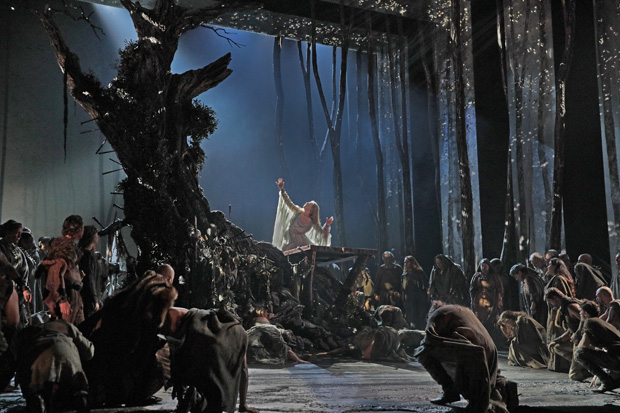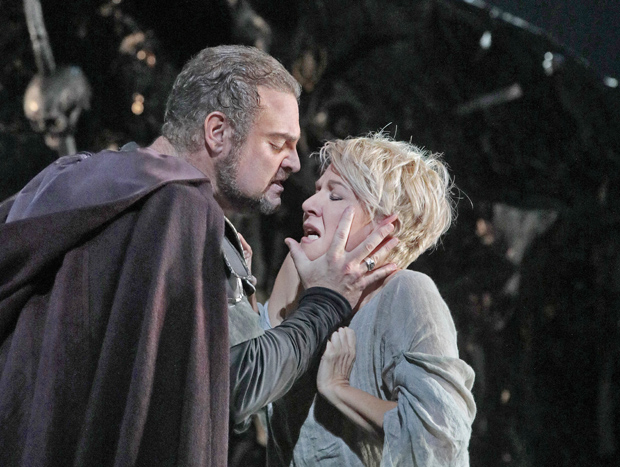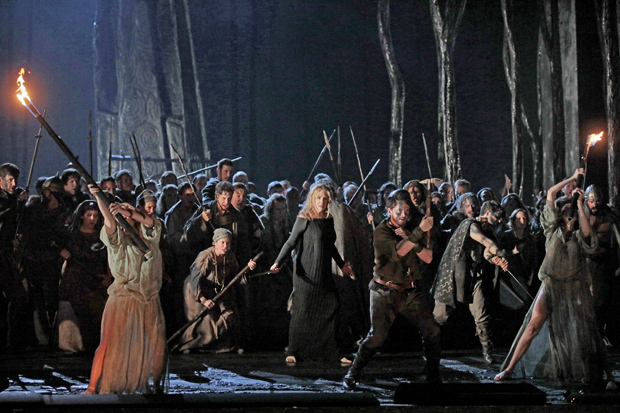
(© KenHoward/MetropolitanOpera)
France is a tinderbox. Open hostility looms against a backdrop of religious fervor. One leader holds it all together through sheer force of will, but how long can that last? OK, so France was actually called Gaul in the time period of Felice Romani and Vincenzo Bellini's Norma, but the political situation that undergirds this classic bel canto opera could describe a lot of different places today and throughout history, including Gaul's geographic successor.
Director David McVicar opts for a more traditional setting (the ancient one originally envisioned by Bellini and Romani), resulting in a beautiful, if occasionally boring production. The attractive druid imagery of the design and top-notch vocal performances are marred by an often-static staging. This is an unfortunate misstep for an opera that has all the right ingredients for combustion.
Set in Roman-occupied Gaul, the story opens with an army of Celtic warriors prepared to strike back against their oppressors. Only high priestess Norma (Sondra Radvanovsky) can quell their rage. But she has a terrible secret: For years she has been having an affair with the Roman proconsul, Pollione (Joseph Calleja), resulting in two children. Now Pollione is dropping Norma for a younger woman, a novice of her order named Adalgisa (Joyce DiDonato). Will this be the injury that finally convinces Norma to let slip the dogs of war?
Radvanovsky illuminates Norma's internal struggle in a performance that is literally breathtaking. We experience Norma's power of persuasion firsthand as Radvanovsky holds us transfixed for a time-stopping interpretation of "Casta Diva." Her glistening voice floats over the room, beseeching our patience and wrapping us in its warm embrace. We would follow her anywhere, so it's only natural that these operatic Celts would do the same. Radvanovsky gives a revelatory performance that shows Norma for who she really is: a woman who is constantly struggling against her own selfish urges for the sake of peace and the greater good.

(© KenHoward/MetropolitanOpera)
No so for Pollione: Calleja plays him like a macho man, taking whatever he wants and never apologizing. Who are the barbarians and who are the civilizers here, exactly? Calleja made his debut in this role just last year in Alex Ollé's Catholic Taliban production at the Royal Opera House. That staging imagined Pollione as a waffling liberal politician. While this take is a more conventional one, it also feels more urgent in this age of unbridled male id. Happily, Calleja sings it unapologetically as well, with his ringing tenor easily filling the room. His is a voice that was truly made for the Met.
DiDonato gives a memorable performance as the hand-wringing Adalgisa. Her cabaletta with Radvanovsky is particularly thrilling, with both singers exhibiting gorgeous harmony and flawlessly coordinated phrasing. We get a perfect sense of the complicated and intimate relationship between these two women.
Unfortunately, the chorus (which sounds excellent) doesn't fare as well under McVicar's unspecific staging, which clumps them together upstage. Far too much time is wasted ushering them on and off in scenes that resemble a throng of New Yorkers crowding around the subway stairs. Too many times we catch the singers waiting for the cues, suggesting that they are suffering from a lack of things to do..
McVicar at least marshals the Met's impressive design resources effectively. Robert Jones's set evokes the magic of a druid grove, with the second set managing to capture the intimacy of Norma's hut. Moonlight kisses the chimney of that dwelling under Paule Constable's nocturnal lighting, which conveys the heavy air of a sleepless night. Moritz Junge's costumes complete the look, with the priestesses donning gauzy green robes that make it appear as though they emerged from the primordial Earth.

(© KenHoward/MetropolitanOpera)
Conductor Carlo Rizzi conducts the evening with balance and care, setting a high bar with an electrifying overture and never relenting from there. We hear every note of the mischievous string and foreboding brass parts without any of it ever overpowering the vocalists.
And really, it's the singers you're going to remember from this production. Radvanovsky, Calleja, and DiDonato are all stars who seem poised to rise even higher in the coming years. Don't miss out on your chance to say you were there when they appeared together.








